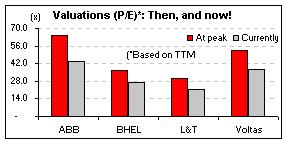Capital goods and PEG!
Source: EM
The taste of apprehension in light of the US Federal Reserve's impending meeting on June 29 was experienced yesterday, as Indian equity markets declined by over 3% with stocks from the capital goods sector witnessing significantly sharper declines. Engineering and construction stocks have been rallying, as they were proclaimed to be the darling of the street based on the strong growth story, which was magnified by their burgeoning order books. 'Attractive PEG ratio' was also used as a reasoning tool to recommend stocks from the sector. So, what has changed?
Nothing really, as far as the fundamentals are concerned! Companies from the sector continue to rake in strong order bookings on the back of infrastructure drive in the country. Key beneficiaries are companies serving the needs of the power, road construction and oil and gas sectors. Investors need to understand that strong order bookings, while providing companies with some visibility into the future, should not justify high valuations. Order books follow a long cycle i.e., it takes almost 24 to 36 months for a company like BHEL to convert its order bookings into actual revenues. And in this long period of time, there can be many variables that can play havoc with the company's estimates on the execution front. Some of these variables can be changes in government policy, the overall investment environment, and volatility in input prices (availability of key raw materials and fuel sources) and uncertainty with respect to retention of key personnel. Indian engineering majors 'are' facing some of these issues currently, and that makes the timely execution of the order backlog highly unpredictable. In high times (when stock prices are rising and everything seems hunky dory), another 'criminal agent' that takes centre-stage is the 'PEG' ratio or 'price to earnings growth ration'. Participants argue that since a company is expected to grow earnings at 40% to 50% per annum in the next 2 to 3 years, they 'must' command similar kind of price to earnings valuations. That is to say that anything below a PEG of 1 is 'attractive'! Another example of plain and simple logic taking backseat while greed being in the driver's seat! As indicated above, considering that the gestation period for capital good companies is typically long (orders take a long time to convert to revenues), and that several unknown variables can impact performance during this period, using PEG to justify high valuations should be a 'no-no' for long-term investors.  However, valuations of companies from the sector have taken a severe beating during the past few weeks. If one were to take a look at the adjacent chart, the magnitude of the fall can easily be identified. For instance, ABB India, which, at its 52-week high levels, was trading at an obnoxious price to earnings multiple of 64.5 times training 12-month (TTM) earnings, currently trades at 43.8 times, which is still stretched from a medium-term perspective. Another stock is Voltas, which has seen valuations decline from 52.6 times TTM earnings to the current (and more reasonable) levels of 37.1 times earnings.
However, valuations of companies from the sector have taken a severe beating during the past few weeks. If one were to take a look at the adjacent chart, the magnitude of the fall can easily be identified. For instance, ABB India, which, at its 52-week high levels, was trading at an obnoxious price to earnings multiple of 64.5 times training 12-month (TTM) earnings, currently trades at 43.8 times, which is still stretched from a medium-term perspective. Another stock is Voltas, which has seen valuations decline from 52.6 times TTM earnings to the current (and more reasonable) levels of 37.1 times earnings.
- Brokers bullish on Colgate, Ranbaxy, Bharti Airtel
- Global mkt correction to continue: Morgan Stanley (MS - as usual, a perennial bear!)
- Neutral on Ranbaxy Labs: ML
- LN Mittal: The Sultan of steel!
- The ethanol challenge
- Citigroup keeps faith in India story
- Is PMS to be taxed at a higher rate?
- Greed & Fear - CLSA
- Investment Picks - HDFC